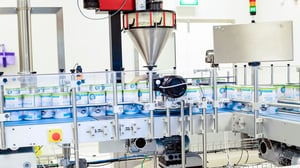For Ashburton-based New Zealand Dairy Collaborative, the focus is firmly on expansion, as the company looks to take on new markets, new products and new employees.
A milk powder packaging and blending plant, Dairy Collaborative completed the build on its iconic purpose-built factory at the Ashburton Business Estate in 2017. Since then, the company has been providing a contract-manufacturing service for manufacturing Oral Nutritive Supplementary Food (ONSF) products, with international clients in China, Taiwan and South-East Asia, and national clients, including Fonterra and Westland. The majority of the milk powder end products are exported and range from products for infants and toddlers, through to sportspeople, pregnant women, and the elderly.
Still a relatively young company, the journey to date has not been without its challenges, with Commercial Manager Paul Huang saying they had a very steep learning curve right from the start.
“The new facility was built and set up in 2017, but we didn’t receive our MPI accreditation to pack commercial products until the end of 2019 – right in the middle of the pandemic. Our very first container out of New Zealand was during the lockdown, so we were working out how to manage operating within COVID-19 guidelines as an essential service, while also navigating complex export systems.”
Another challenge has been the process around accessing duty drawbacks. “Last year, we came across a new client based in China who was looking for goat milk formulation powder. At the time, we were looking at New Zealand goat milk powder, but the cost was too prohibitive, so we looked offshore where we could source the milk powder, package it and then export to China.
“The client agreed and we purchased 20 metric tonne of goat milk powder from the Netherlands, arriving in June and August last year. Upon entry there was a duty, but we knew that upon export those duties could be drawn back. The process however wasn’t so straight forward, and it wasn’t approved until January this year. We had built our profit margins around the duty drawbacks, so without them we were operating at a loss. This meant the bottom line of our business was significantly impacted for over a quarter – and we are only a small business – so we likely won’t be repeating that exercise and instead will be focusing on packaging local powder.”
It was during this time that Paul, a Business Canterbury member, connected with the Business Canterbury team at one of the Advocacy Forums in Ashburton.
“I met Business Advisor Jason MacRae at the advocacy event who was very resourceful. He took the time to sit down with me and do a business overview to look at challenges, and also opportunities such as factory utilisation and expansion, as well as connecting me with key distribution contacts for Carimax. He also introduced me to International Trade Advisor Daniel Thompson, who was able to help with exporting and using their connections and expertise to smooth that process. I am very grateful for their help.”
Currently the Dairy Collaborative employs 12 full-time staff and a small number of part-time staff. It is also only operating its 6,295m2 factory at a fraction of its capacity, which Paul says is one of the things he is keen to change.
“We currently sit at around 30% occupancy, running a single shift. If we are able to secure more long-term, stable clients, we would be able to expand to a second shift and hire more staff. The challenge is that due to the nature of the work, onboarding staff requires extensive training for strict health and safety measures as well as specialist machine operation, so we need to ensure a steady pipeline of work for this to happen.”
To increase the product-line, the Dairy Collaborative has just introduced its own branded product, Carimax, to be sold in New Zealand and overseas. While the product hasn’t yet hit the market, distribution negotiations are currently underway, with the goal of Carimax being on the shelves later this year.
“We are still very much developing the business to the level we want it to be, as there is plenty of room to grow, but it’s about doing this in a long-term sustainable way. Ashburton has a thriving business community, so it’s great to be able to do our part in growing the local economy.”
.png?width=290&name=Untitled%20design%20(69).png)








